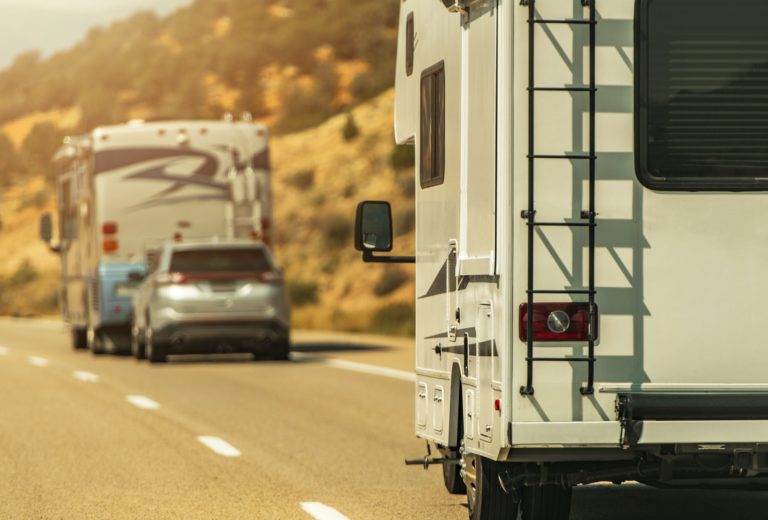The allure of off-grid living in an RV is hard to resist, especially when you consider the freedom and self-sufficiency it can provide. One key aspect of this lifestyle is your power source, and solar power offers an eco-friendly, reliable, and cost-effective solution for meeting your energy needs on the road. In this comprehensive guide, we’ll explore the ins and outs of RV solar power systems for newbies, covering essential topics such as system components, installation, and maximizing efficiency.
1. Understanding the Basics of RV Solar Power Systems
Before diving into the specifics of solar power for your RV, it’s essential to understand the basics of how these systems work and the various components involved.
Key components of an RV solar power system:
- Solar Panels: These are the primary collectors of sunlight, which is then converted into electricity. Panels come in various sizes and types, such as monocrystalline, polycrystalline, and thin-film.
- Charge Controller: This device regulates the flow of electricity from the solar panels to the batteries, preventing overcharging and ensuring optimal charging performance.
- Batteries: The energy captured by solar panels is stored in batteries for later use. There are different types of batteries, including flooded lead-acid, sealed lead-acid, and lithium-ion, each with its own pros and cons.
- Inverter: Since solar panels and batteries produce direct current (DC) electricity, an inverter is necessary to convert the DC power into alternating current (AC) power, which can be used by most RV appliances and devices.
- Wiring and Mounting Hardware: To connect all the components and secure the solar panels to your RV, you’ll need appropriate wiring, connectors, and mounting hardware.
2. Determining Your Solar Power Needs
Before selecting and installing a solar power system for your RV, it’s crucial to determine your energy needs. This will help you choose the right components and ensure your system is capable of meeting your power demands.
Steps to determine your solar power needs:
- List Your Appliances and Devices: Make an inventory of all the electrical appliances and devices you plan to use in your RV, including their power consumption in watts.
- Calculate Daily Energy Usage: Estimate how many hours per day each appliance or device will be used, and then multiply the wattage by the hours of use to determine daily energy consumption in watt-hours.
- Add up the Total Energy Consumption: Add the daily energy consumption of all your appliances and devices to arrive at your total daily energy needs in watt-hours.
- Factor in Sunlight Availability: Consider the average number of sunlight hours per day in the areas you plan to travel. This will help you determine how many solar panels you’ll need to generate the required amount of electricity.
- Plan for Battery Capacity: Calculate the battery capacity needed to store the energy produced by your solar panels. Aim for a battery capacity that can store at least 1.5 to 2 times your daily energy needs to account for variations in sunlight and usage patterns.
3. Choosing and Installing Your RV Solar Power System
Once you’ve determined your solar power needs, it’s time to choose the right components and install your system. While professional installation is an option, many RV owners choose to tackle the installation process themselves.
Tips for choosing and installing your RV solar power system:
- Select Quality Components: Invest in high-quality solar panels, batteries, and other components that offer reliable performance and durability.
- Research Solar Panel Types: Understand the differences between monocrystalline, polycrystalline, and thin-film solar panels in terms of efficiency, cost, and space requirements. Choose the type that best suits your needs and budget.
- Choose the Right Charge Controller: Ensure you select a charge controller that is compatible with your solar panels and batteries and can handle the maximum charging current.
- Opt for an Appropriate Inverter: Select an inverter that can handle the combined wattage of all the AC appliances and devices you plan to use simultaneously. Consider choosing a pure sine wave inverter for better compatibility with sensitive electronics.
- Install Solar Panels Securely: Use sturdy mounting hardware to attach solar panels to your RV’s roof or another suitable location. Ensure the panels are securely fastened and positioned for maximum sunlight exposure.
- Wire the System Correctly: Follow best practices for wiring your solar power system, using appropriate wire sizes, connectors, and fuses to ensure safety and optimal performance.
4. Maximizing the Efficiency of Your RV Solar Power System
To get the most out of your solar power system, it’s essential to optimize its efficiency. Proper maintenance, smart usage strategies, and energy-saving habits can help you harness the sun’s power more effectively.
Tips for maximizing solar power efficiency:
- Keep Solar Panels Clean: Regularly clean your solar panels to remove dirt, dust, and debris that can reduce their efficiency- Monitor and Maintain Batteries: Periodically check your batteries’ state of charge, water levels (for flooded lead-acid batteries), and connections to ensure they are functioning optimally. Replace batteries as needed.
- Optimize Solar Panel Angle: Adjust the angle of your solar panels to maximize their exposure to sunlight, especially during the winter months or when parked in high-latitude locations.
- Use Energy-Efficient Appliances: Choose appliances and devices with low power consumption to reduce your energy needs. LED lighting, induction cooktops, and energy-efficient refrigerators are excellent examples.
- Conserve Energy: Be mindful of your energy usage and adopt conservation habits, such as turning off lights and appliances when not in use, cooking with a solar oven, and using natural ventilation instead of air conditioning.
5. Understanding the Benefits and Limitations of RV Solar Power
As with any technology, solar power has its advantages and drawbacks. By understanding these, you can make an informed decision about whether solar power is the right solution for your off-grid RV lifestyle.
Benefits of RV solar power:
- Environmentally Friendly: Solar power is a clean, renewable energy source that reduces your carbon footprint and reliance on fossil fuels.
- Cost-Effective: While there is an upfront cost for installing a solar power system, it can save you money in the long run by eliminating or reducing the need for generator fuel, RV park fees, and other energy expenses.
- Quiet and Low Maintenance: Solar power systems operate silently and require minimal maintenance compared to generators and other power sources.
- Flexibility and Freedom: With solar power, you can enjoy the freedom to camp off-grid without worrying about access to electricity or the noise and hassle of a generator.
Limitations of RV solar power:
- Initial Cost: The upfront cost of a solar power system can be significant, especially when compared to the cost of a generator. However, the long-term savings can offset this initial investment.
- Weather Dependence: Solar power systems depend on sunlight, which can be affected by weather conditions and seasonal variations. This may necessitate a larger solar array or supplemental power sources to meet your energy needs during periods of limited sunlight.
- Space Constraints: Solar panels require space on your RV’s roof or another suitable location, which can be a challenge for some RV owners. Additionally, the size and weight of batteries may be a consideration for those with limited storage space.
- Complexity of Installation: Installing a solar power system can be complex, particularly for those with limited electrical knowledge. However, many resources are available to assist with the installation process, and professional installation is always an option.
In conclusion, solar power offers an eco-friendly, efficient, and cost-effective solution for RV owners seeking the freedom and self-sufficiency of off-grid living. By understanding the basics of RV solar power systems, determining your energy needs, choosing and installing the right components, and adopting strategies to maximize efficiency, you can harness the sun’s power to meet your energy needs on the road. While there are some limitations to consider, the benefits of solar power make it a worthwhile investment for many RV enthusiasts.






